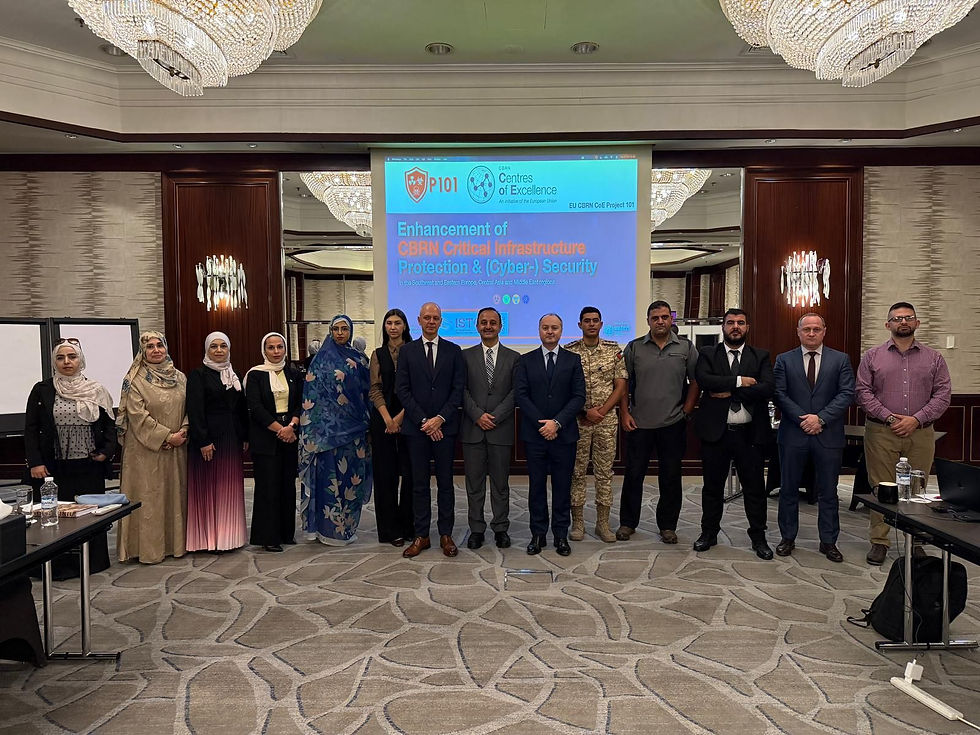14-15 April 2025 - Consultation Visit to Montenegro
- Apr 15, 2025
- 3 min read
Updated: Jun 15, 2025
1. Introduction
As part of the Inception Phase of EU CBRN CoE Project 101, a consultative mission was carried out in Montenegro on 14–15 April 2025. The mission was led by Mr. Alexandre Custaud, Team Leader of the project. The objective of the visit was to engage with national institutions responsible for CBRN-related policy, infrastructure protection, and cyber and physical security, in line with the objectives of Work Package 1 (WP1) of the project.
2. Objectives of the Visit
The consultation aimed to:
Present the scope and methodology of Project 101 to Montenegrin stakeholders;
Identify relevant institutions, infrastructure, and regulatory frameworks connected to national CBRN risk mitigation and critical infrastructure protection;
Initiate dialogue for further cooperation in the implementation phase of the project;
Gather input on national capacities, training needs, and potential areas for collaboration.
3. Summary of Meetings and Discussions
Day 1 – 14 April 2025
Welcome and Opening Plenary – Ministry of Foreign Affairs
The delegation was welcomed at the Ministry of Foreign Affairs, where an initial plenary session was held. The meeting was moderated by Mr. Predrag Prelević, Counsellor, Directorate General for Multilateral Affairs. Mr. Custaud introduced the goals of the project and presented its structure, timeline, and expected outcomes.
Representatives from relevant Montenegrin institutions participated and expressed their interest in engaging with the project. The discussion focused on existing coordination mechanisms, national regulatory frameworks, and areas where international cooperation could support national efforts.
Site Visit – CETI and Sealed Radioactive Waste Depot
In the afternoon, the delegation visited the Center for Ecotoxicological Research (CETI), accompanied by Acting Executive Director Dr. Nikola Cvrkota. The team received a briefing on CETI’s role in hazardous waste monitoring and was granted access to the sealed radioactive waste depot, gaining insight into existing physical protection measures and institutional responsibilities.
Meeting with the Western Balkans Cyber Capacity Centre (WB3C)
The delegation met with Mr. Gilles Schwoerer, Head of Office at WB3C, to discuss cybersecurity challenges relevant to national critical infrastructure. The discussion focused on inter-agency coordination, cyber training initiatives, and links between digital resilience and broader CBRN protection strategies.
Day 2 – 15 April 2025
Meeting at the Ministry of Internal Affairs
The delegation met with Mr. Ljuban Tmušić, Assistant Minister a.i. and Head of the Department for Civil Protection and Disaster Risk Reduction. The discussion covered Montenegro’s national emergency response structure, its role in civil protection, and mechanisms for incident coordination involving hazardous materials or CBRN-relevant events.
Visit to the Port of Bar
Following a transfer to the coastal city of Bar, the delegation was received by Mr. Ilija Pješčić, Executive Director of the Port of Bar. Discussions focused on port security, the handling of sensitive or hazardous cargo, and physical protection systems in place at the port infrastructure.
Meeting with Customs Administration at the Port of Bar
A final meeting was held at the Bar Border Crossing Terminal with Mr. Djuro Krivokapić, Head of the Customs Office. Customs representatives explained their procedures for screening, detection, and control of goods that may present chemical, biological, or radiological risks. Attention was given to inter-agency coordination and existing technical capabilities.
4. Observations and Conclusions
Montenegro has an engaged institutional landscape covering civil protection, environmental monitoring, cybersecurity, and port security.
Existing coordination mechanisms can be further supported through regional exchanges and joint training under the P101 framework.
There is a strong interest in the development of tailored training programs and the adoption of international best practices related to CBRN infrastructure protection.
The potential for collaboration on equipment needs assessment and capacity building was acknowledged across all meetings.

















